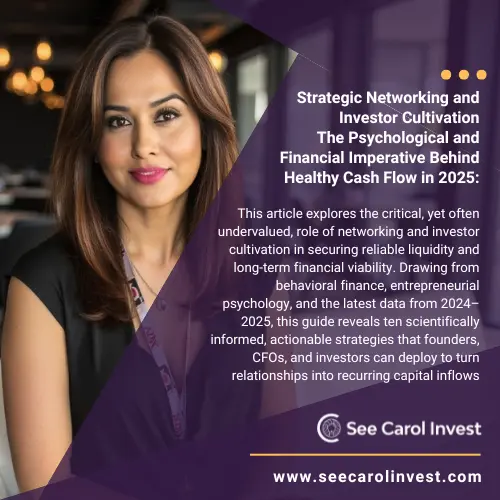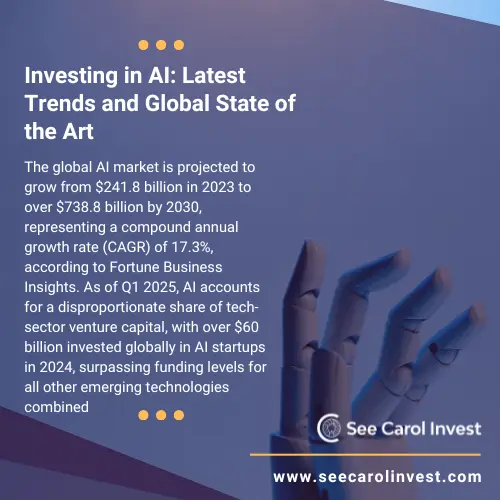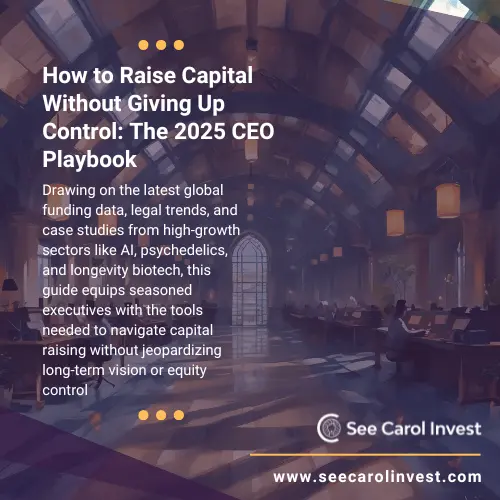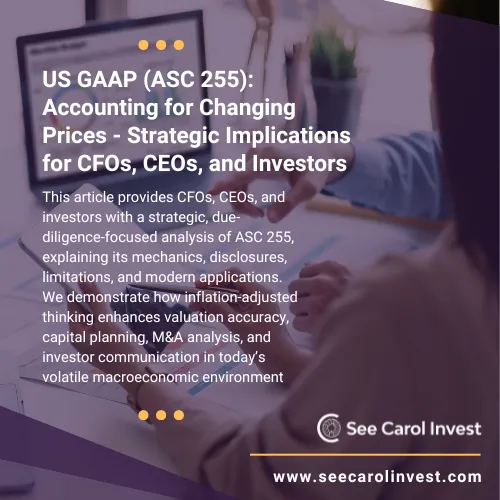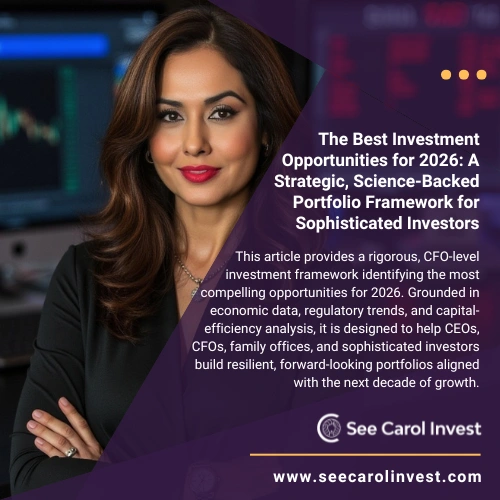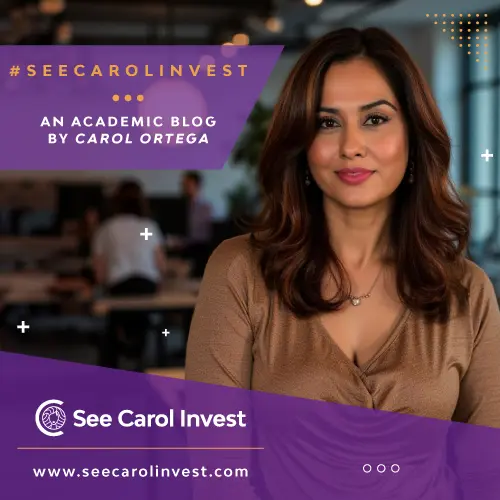Strategic Networking and Investor Cultivation: The Psychological and Financial Imperative Behind Healthy Cash Flow in 2025
Abstract:
In 2025’s hyper-competitive global financial environment, healthy cash flow remains the lifeblood of sustainable enterprises—particularly for startups and mid-stage companies. This article explores the critical, yet often undervalued, role of networking and investor cultivation in securing reliable liquidity and long-term financial viability. Drawing from behavioral finance, entrepreneurial psychology, and the latest data from 2024–2025, this guide reveals ten scientifically informed, actionable strategies that founders, CFOs, and investors can deploy to turn relationships into recurring capital inflows. Emphasis is placed on the interdependence between psychological trust-building, strategic visibility, and sustainable wealth creation.
Introduction:
In the complex world of modern business, liquidity is not solely a function of revenue but of relationships. According to a 2025 survey by PitchBook and CB Insights, 76% of startups that raised successful bridge rounds cited “existing investor trust and proactive communication” as the primary driver of renewed capital. In an economic landscape where interest rates remain volatile and capital allocation is increasingly risk-sensitive, cultivating a reliable and engaged investor network has become a mission-critical function.
This article dissects the psychology and financial mechanics behind relationship-based capital management, focusing on how network nurturing can serve as both a buffer and catalyst for healthy, predictable cash flow.
I. The Financial Value of Relationships
1. Investor Confidence Drives Liquidity
According to Crunchbase 2024 data, companies that maintained regular monthly investor updates experienced a 38% faster fundraising cycle in Series A and B rounds. Liquidity is not merely about cash on hand but about confidence in continuity. An informed investor is more likely to reinvest, offer bridge capital, or open access to their own networks.
2. Recurring Capital vs. Emergency Funding
Healthy cash flow is not just income minus expenses—it’s about predictability. Cultivated investor relationships provide ongoing funding opportunities (convertible notes, equity infusions, revenue-based financing), rather than desperate, last-minute bridge rounds that lead to dilution or costly terms.
3. Reduced Cost of Capital
According to McKinsey’s Private Capital Report (2025), startups with well-managed investor relations secured capital at an average of 4.1% lower equity dilution compared to companies with limited transparency or poor relationship-building practices. Strategic communication and trust reduce perceived risk, lowering the investor’s required return.
II. The Psychological Science of Network Cultivation
4. Social Capital = Financial Capital
Sociologist Pierre Bourdieu’s framework of “social capital” has long emphasized that networks of relationships constitute a resource that can be mobilized for economic gain. Behavioral finance expands this by demonstrating that trust reduces cognitive load in decision-making, accelerating deal execution.
5. The Trust Equation
Harvard Business Review (2024) identifies four key elements of trust in professional networks: credibility, reliability, intimacy, and self-orientation. Founders who consistently exhibit these traits are 2.4x more likely to secure long-term investment partners.
6. Neuroeconomics and Reciprocity
Neuroeconomic studies (Knutson et al., 2024) reveal that the human brain lights up in the striatum—the reward center—when engaging with someone they trust financially. Trust builds a feedback loop of generosity, leading to reciprocity: well-nurtured investors are more willing to reinvest or extend favorable terms.
III. The Strategic Importance of Attending Networking Events
7. Data-Driven Exposure
A 2025 report from the Global Entrepreneur Monitor (GEM) found that entrepreneurs attending 6+ investor-focused events per year raised 3x more capital than those attending fewer than 2. Each appearance is a form of signaling: commitment, credibility, and visibility.
8. Storytelling in the Room
Networking events provide opportunities for authentic storytelling—a critical psychological lever in investor decision-making. Founders who master narrative frameworks (hero’s journey, vision-to-market, founder hardship) are statistically more memorable and garner higher follow-up rates.
9. Peer Learning and Trend Absorption
Events such as the Venture Capital World Summit and Longevity Investor Circles offer entrepreneurs valuable intelligence on what investors are currently prioritizing (e.g., AI, longevity biotech, clean energy). Staying ahead of investor psychology allows companies to reposition for relevance—an indirect boost to funding success.
IV. Ten Practical Tips for Building a Productive Investment Network
- Send Quarterly or Monthly Investor Reports:
Use simple dashboards with KPIs, cash flow forecasts, and upcoming needs. Transparency reduces perceived risk. - Host Closed-Door Investor Roundtables:
Position your brand as a thought leader by inviting small groups to strategic discussions. Leverage intimacy. - Invest in a Strong Investor CRM:
Tools like Affinity or Attio allow tagging, tracking, and reminders to maintain warm relationships at scale. - Curate “Insider” Updates for Key Investors:
Deliver exclusive updates with strategic pivots, hiring moves, or early-access product trials. - Attend at Least One Industry Event Per Quarter:
Prioritize events with both capital providers and industry operators. Be visible, prepared, and personable. - Offer Co-Investment or Syndicate Opportunities:
Tap into investor networks by creating FOMO and shared upside. Investors love deals their peers endorse. - Respond Rapidly and Thoughtfully to Investor Questions:
Demonstrate operational mastery and intellectual honesty. This builds cognitive trust. - Educate Investors on Market Trends:
Through newsletters, blog posts, or webinars—position yourself as a market guide, not just a founder. - Be Consistent with Your Messaging Across Channels:
Inconsistent stories raise red flags. Align pitch decks, blogs, emails, and event talks. - Use Psychological Priming in One-on-One Meetings:
Subtly reinforce success narratives and alignment using cognitive framing (e.g., “As we scale together…”).
V. Why Investors Need to Know Founders Personally
According to Angel Capital Association’s 2025 Benchmarking Report, 91% of angel investors prefer investing in founders they have met at least three times before wiring funds. In-person interactions humanize metrics. They offer a window into the founder’s resilience, coachability, and passion—all of which are non-financial proxies for success.
Moreover, investor-founder alignment on values (e.g., sustainability, inclusion, mental health) has been correlated with longer retention and reinvestment. The 2024 Kauffman Fellows Research Center study revealed that mission-aligned investors were 48% more likely to participate in follow-on rounds.
VI. California as a Hub for Relationship-Based Investment Flow
Silicon Valley for AI
In 2025, Silicon Valley continues to be the epicenter of AI startups, attracting over $60 billion in AI-related VC funding (CB Insights, Q1 2025). This region’s hyper-dense investor ecosystem thrives on relationships and proximity. Founders benefit from ecosystem spillover, where one warm intro can unlock multi-million-dollar rounds.
Los Angeles for Longevity
L.A. has quietly become the world’s capital for longevity science. With investors like Peter Diamandis and firms like Cambrian Bio and Methuselah Fund headquartered here, attending local events can create serendipitous introductions that are nearly impossible to orchestrate elsewhere.
California as the U.S. Gateway for Global Investors
California attracted 24.6% of all U.S. inbound VC funding from international accredited investors in 2024 (NVCA data). These investors are often less familiar with emerging founders and rely heavily on network trust, reputational cues, and third-party endorsements. Local visibility—especially in LA and Silicon Valley—is your passport to global capital.
Conclusion
In a world increasingly shaped by data, the human dimension of investing remains paramount. Networking is not a “soft skill” but a strategic financial lever. Relationships generate more predictable cash flows, lower cost of capital, and open doors to long-term wealth creation.
Startups and growth-stage companies in 2025 must approach investor cultivation not as a side task but as a core strategic function—interweaving behavioral science, psychological storytelling, and targeted visibility. Events, updates, shared values, and trust are not just buzzwords; they are cash flow mechanisms.
By nurturing the right network, entrepreneurs and CFOs alike can future-proof their balance sheets.
Join the Conversation
At See Carol Invest, we proudly reach a growing audience of over 10,000 accredited investors, founders, and CFOs across the Americas. We’re building the most respected, data-driven hub for strategic investment analysis. Join and support our efforts! 


